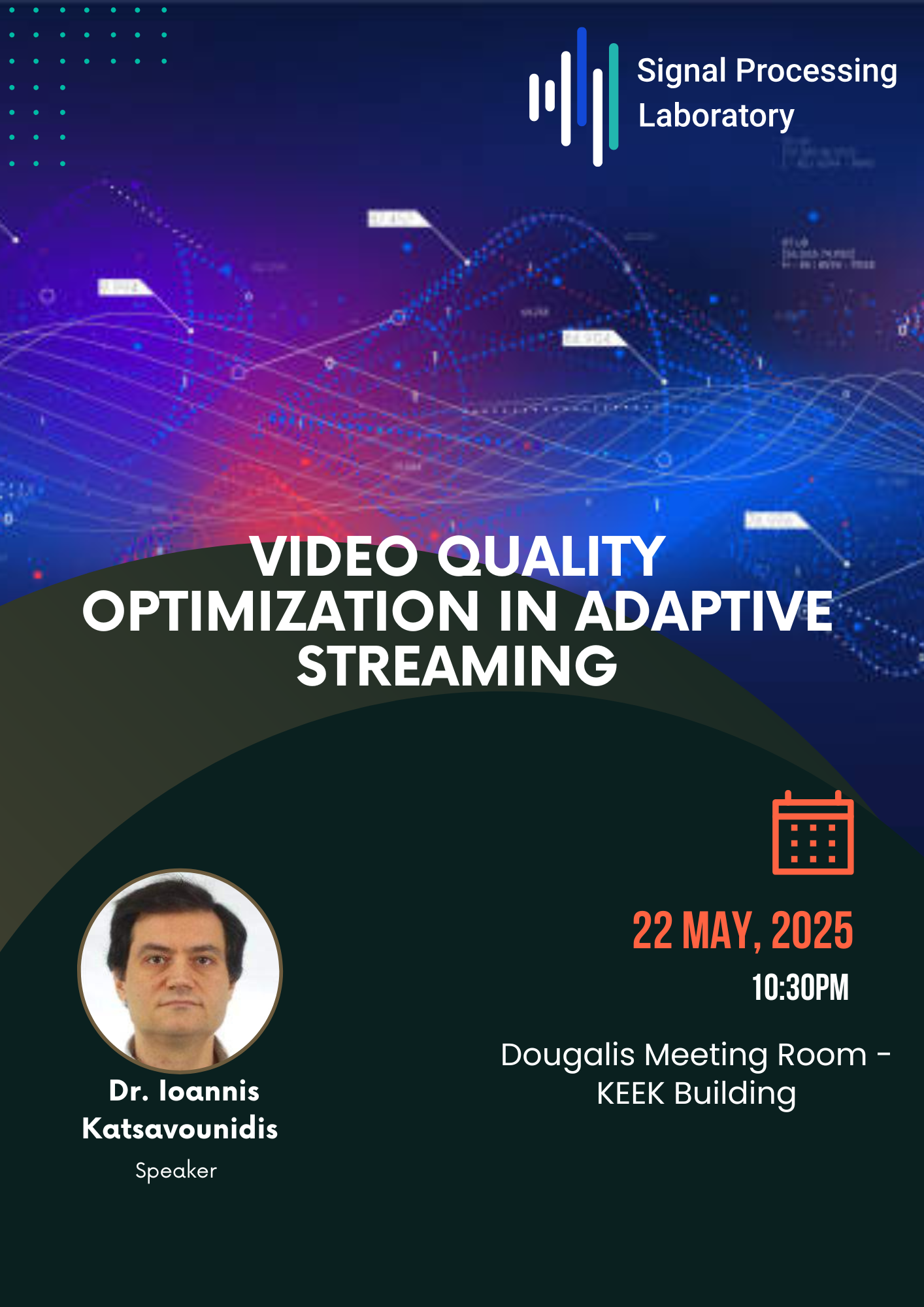
Speaker : Dr. Ioannis Katsavounidis Research Scientist, Video Infrastructure, Meta 2025 IEEE Distinguished Industry Speaker
Date : 22.05.2025
Time: 10.30 to 13.00
Location : Dougalis Meeting Room - KEEK Building
Host : Prof. Panos Tsakalidis, SPL/ICS FORTH
Abstract: :
We will review the history of video encoding, covering aspects of video codecs and quality metrics that have been exploited in finding ways to optimize video delivery. The roots of convex optimization in video coding, that connect statistical multiplexing, rate-distortion optimization and how all this led to the dynamic optimization framework will be discussed next. The video encoding (and quality metrics) complexity will also be discussed and the concept of a three-part tradeoff among bitrate-quality-complexity will be presented, as well as how important of a role it plays in massive video processing systems. SW and HW transcoding pipelines will be analyzed and we will conclude with an array of open research problems, including the use of ML/AI in video coding and video quality metrics.
Short Bio:
Ioannis Katsavounidis (IEEE SM) studied Electrical Engineering at the Aristotle University of Thessaloniki, Greece, from 1986-1991, where he received a 5-year B.S. degree with double specialization in Electronics/Computer Engineering and Telecommunications. He continued his graduate studies in Electrical Engineering at the University of Southern California (USC), CA, USA, from 1991-1998, receiving M.S., EEE and Ph.D. degrees in 1992, 1997 and 1998 respectively. His work and research were focused on Signal Processing, as part of the Signal and Image Processing Institute (SIPI), with minor in Telecommunications and another minor program in Mathematics.
Dr. Katsavounidis was part of Caltech's High Energy Physics department research team at the Italian National Laboratory at Gran Sasso (Laboratori Nazionali del Gran Sasso – LNGS) (1996 to 2000); member, Italian network of research institutes in Nuclear Physics (Istituto Nazionale di Fisica Nucleare – INFN), working as engineer for the MACRO (Monopoles, Astrophysics and Cosmic Ray Observatory) large-scale high-energy physics experiment. He worked at InterVideo, a startup company based in Fremont, CA, USA (2000 to 2007); co-founder, CTO and Chief Scientist of Cidana, San Francisco Bay Area, CA, USA (2007 to 2008); Associate Professor, Department of Electrical and Computer Engineering at the University of Thessaly in Volos, Greece (2008 to 2015); Senior Research Scientist at Netflix in Los Gatos, CA, USA, (2015 to 2018).
He is a Research Scientist at Meta Platforms in Menlo Park, CA, USA, (2018 till present) part of the Video Infrastructure team, supporting all video processing for the popular Facebook, Instagram and Messenger applications. He led the efforts from Video Infrastructure to design Meta's Scalable Video Processor (MSVP), a custom ASIC that is used in Meta's datacenters for all the back-end transcoding and quality measurement tasks. MSVP received in 2024 the 75th Technology and Engineering Emmy Award in the "Design and Deployment of Efficient Hardware Video Accelerators for Cloud" category.
Dr. Katsavounidis has been serving as co-chair of the Software Implementation Working Group (SIWG) at the Alliance for Open Media, as a co-chair of the No-Reference Quality Metrics (NORM) and Statistical Analysis Methods (SAM) groups at the Video Quality Experts Group. He holds two music degrees; a BA in music theory, awarded in 1990 by the Macedonian School of Music in Thessaloniki, Greece and a MA in classical piano performance, awarded in 1991 by the School of Music in Veria, Greece. Dr. Katsavounidis is a Senior Member of IEEE; Member, IEEE Signal Processing (SPS) and IEEE Computers and Systems (CAS) societies. He is a member of SPIE and the Technical Chamber of Greece. He received the Distinguished Alumni award (senior industry category) at the 50th anniversary of the Signal and Image Processing Institute at the University of Southern California in 2022. He has organized and led industry workshops at ICIP conferences since 2019 and ICASSP conferences since 2023.
